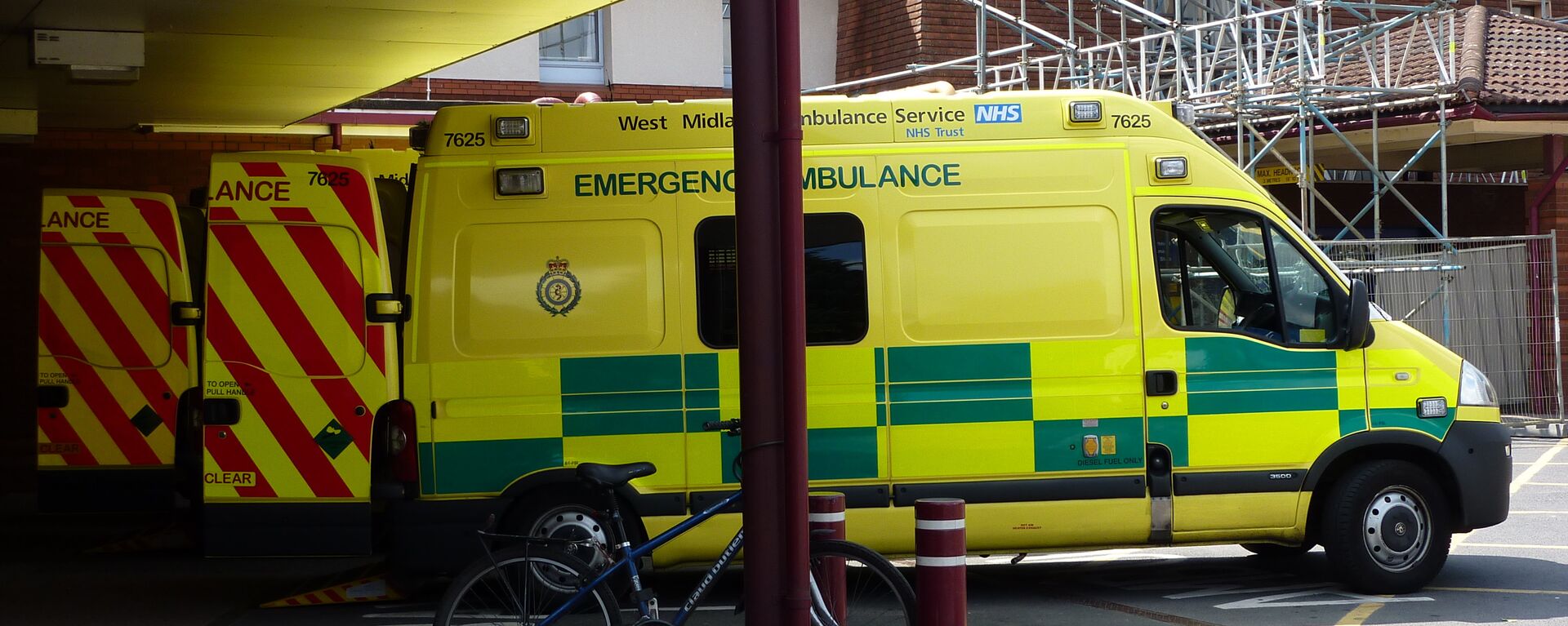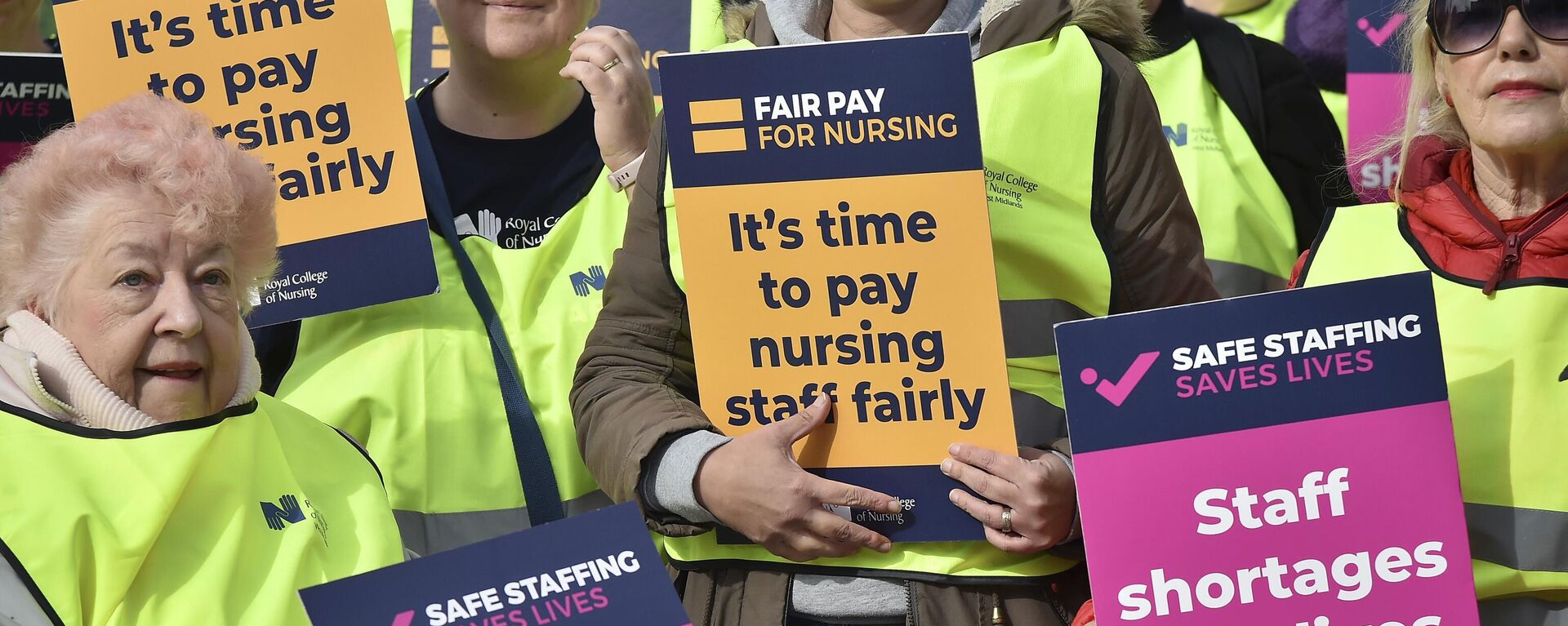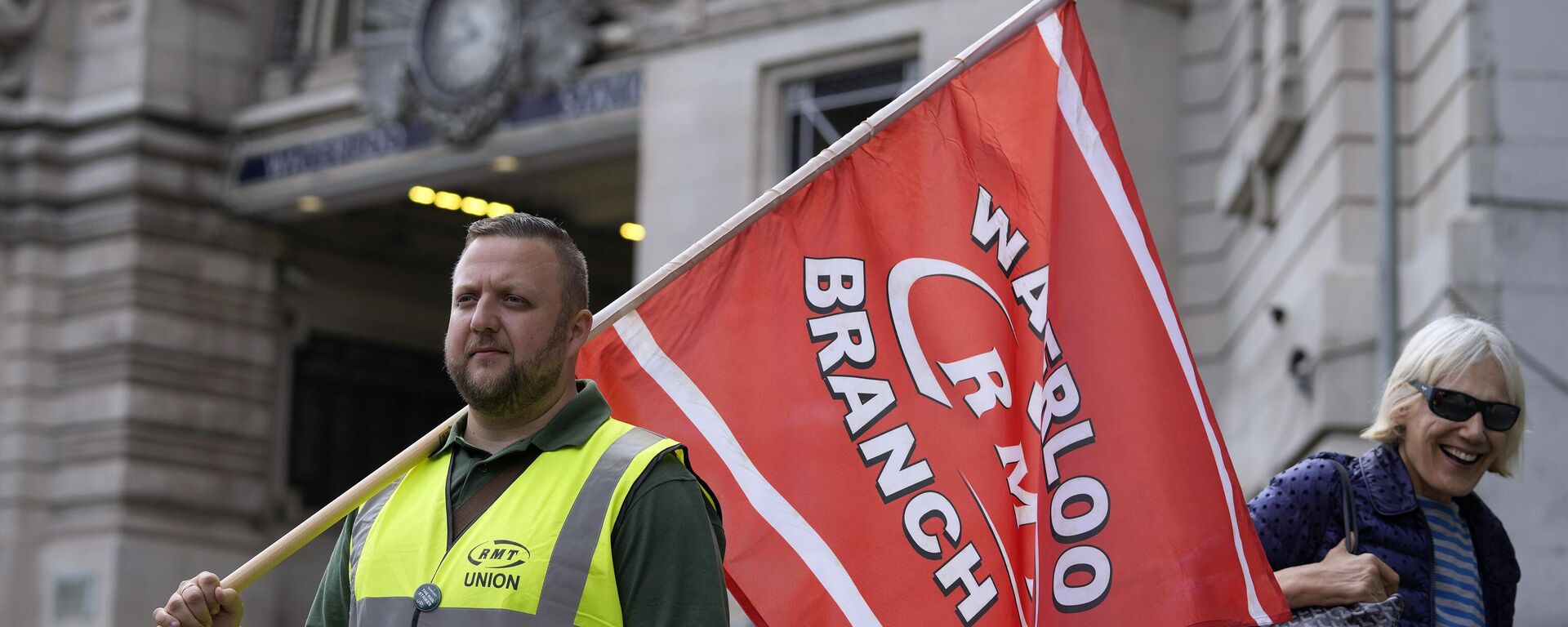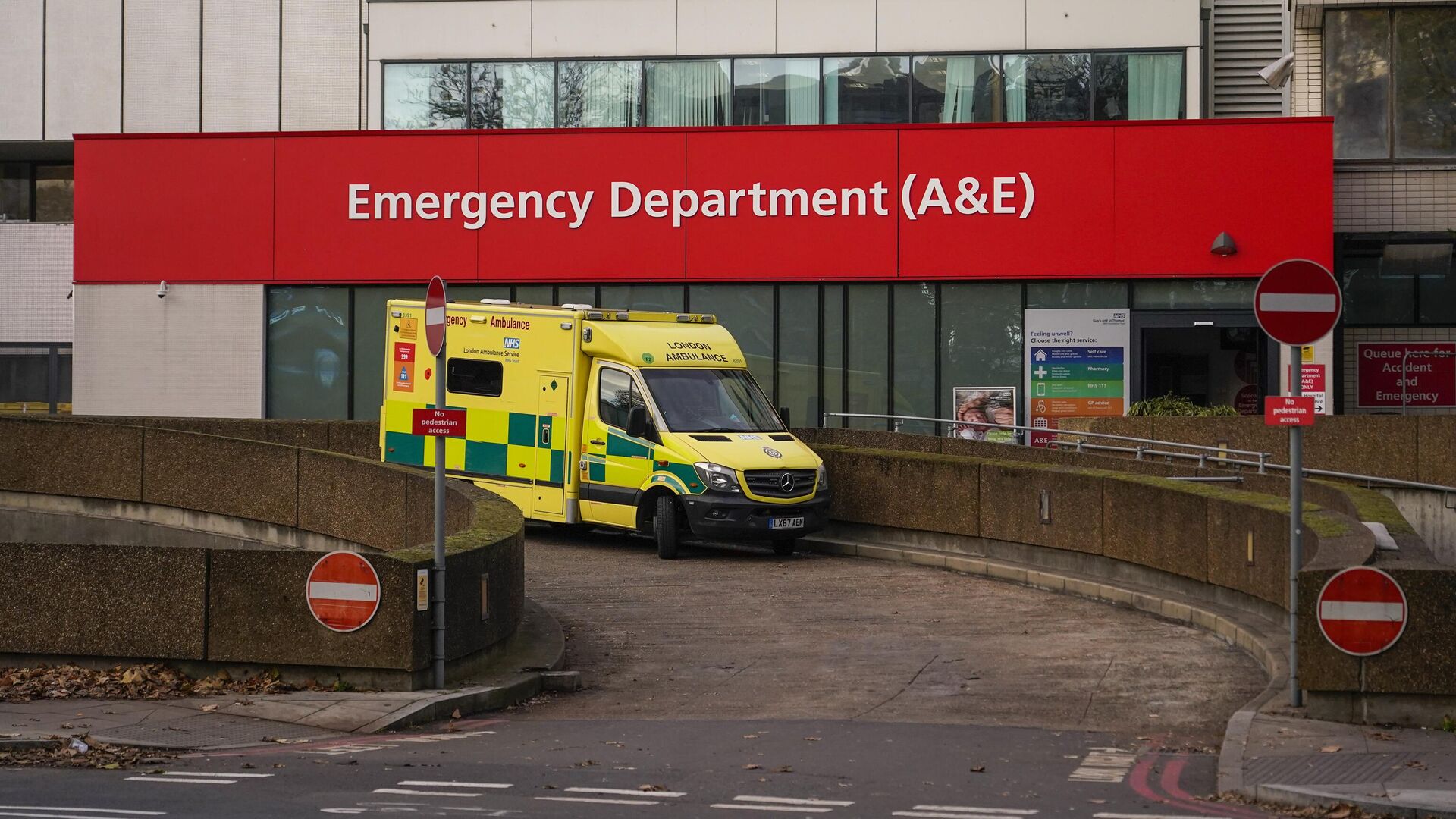https://sputnikglobe.com/20221220/uks-striking-ambulance-staff-may-refuse-to-take-heart-attack-calls-from-home-1105626186.html
UK's Striking Ambulance Staff Could Refuse to Take Heart Attack Calls From Home
UK's Striking Ambulance Staff Could Refuse to Take Heart Attack Calls From Home
Sputnik International
Striking ambulance staff across the UK may not respond to emergency calls for heart attack and stroke victims from home.
2022-12-20T05:56+0000
2022-12-20T05:56+0000
2023-05-28T15:25+0000
strike
ambulance
world
unite union
gmb union
steve barclay
united kingdom (uk)
https://cdn1.img.sputnikglobe.com/img/07e6/0c/01/1104942127_0:208:3073:1936_1920x0_80_0_0_a8787639aa022c4fb715a94fad4e5727.jpg
Ambulance crews in parts of the UK may not respond to calls from heart attack or stroke victims at home on Wednesday, as around 10,000 ambulance staff in England and Wales strike over pay on 21 and 28 December, local media has reported.The decision is part of an agreement between the Unison union, representing the interests of the North East Ambulance Service, and National Health Service (NHS) bosses. According to the North East Ambulance Service, the deal with the trade union presupposed that during the strike, emergency care staff could respond "to category one calls and category two calls in a public place”. Such conditions as heart attacks, strokes, sepsis and grave burns all fall into category two. The typical target time of response for such cases is within 18 minutes.Although there has been no clarification regarding the agreement reached on strike exemptions, if any, with Unite, the GMB union revealed that paramedics would be taking category one 999 calls. These calls are reserved for life-threatening injuries and illnesses, such as cardiac arrest.The industrial action scheduled for 21 December was called by the three main ambulance unions - Unison, the GMB and Unite - and GMB union members are also to walk out on 28 December. Paramedics, ambulance technicians and call handlers are all taking part in the walkout.In the run-up to the anticipated disruption, people have been urged to “use services wisely and prepare where possible”, with a warning from Segasby that ambulances will only be able to respond in cases posing an immediate risk to life.On the eve of the strike, a Department of Health source told UK media that some union officials had not confirmed whether they would be taking all emergency calls, with the government reportedly setting in place contingency plans, such as deploying military personnel.Throughout the UK, ambulance staff voted to strike over pay offers that fall way short of the inflation level. In late November, the UK's biggest health union Unison announced that some 80,000 of its 1.3 million members had voted to strike after rejecting a four percent pay offer from the National Health Service (NHS). Unison general secretary Christina McAnea emphasized that the decision had been taken because the government had "adamantly refused" to engage in a "proper discussion" on pay.Echoing these sentiments, Unite leader Sharon Graham was cited as blaming UK Health Secretary, Steve Barclay, saying:Barclay, however, has insisted that the door for talks is open and invited the three unions to hold last-ditch talks. But according to him the staff pay rises that the NHS unions are demanding are "unaffordable". Barclay also reiterated that it was up to the independent NHS pay review body to decide what pay offers to make. The latter proposed pay rises of around 4.75 percent, with a guaranteed minimum of £1,400.The United Kingdom has been shattered by an unprecedented wave of strikes by civil servants over the past months. Reacting to the worsening economic situation caused by soaring inflation, employees of railway companies, post offices, airports and lawyers, among others, have been taking part in industrial action. The country's largest nursing union, the Royal College of Nursing, (RCN) also launched its first strike in its 106-year history on 15 December, with the second strike on 20 December.The RCN union has been demanding a salary hike of 5 percent above inflation for the Retail Price Index (RPI) in the UK, which was 14 percent in November 2022, claiming that the earnings of its members plummeted by 6 percent in the past decade. The 4 percent hike offered by the independent NHS Pay Review Body was dismissed as unfair and even "insulting."There is other industrial action looming, with the main union representing Border Force staff expected to walk out between 23 and 31 December. Furthermore, fresh postal strikes are scheduled for 23 and 24 December and the RMT rail workers' union is planning walkouts at the very end of the month.
https://sputnikglobe.com/20221130/first-uk-wide-ambulance-strike-in-30-years-looms-as-inflation-hits-pay-packets-1104883280.html
https://sputnikglobe.com/20221215/uk-nurses-begin-biggest-strike-in-their-history-over-below-inflation-pay-offer---photos-1105479268.html
https://sputnikglobe.com/20221125/new-winter-of-discontent-strike-wave-threatens-uk-christmas-festivities-1104695434.html
united kingdom (uk)
Sputnik International
feedback@sputniknews.com
+74956456601
MIA „Rossiya Segodnya“
2022
News
en_EN
Sputnik International
feedback@sputniknews.com
+74956456601
MIA „Rossiya Segodnya“
Sputnik International
feedback@sputniknews.com
+74956456601
MIA „Rossiya Segodnya“
striking ambulance staff, 999 heart attack, stroke calls from home, industrial action over pay, how fast will ambulance arrive in the uk, uk strikes, uk nurse strikes,
striking ambulance staff, 999 heart attack, stroke calls from home, industrial action over pay, how fast will ambulance arrive in the uk, uk strikes, uk nurse strikes,
UK's Striking Ambulance Staff Could Refuse to Take Heart Attack Calls From Home
05:56 GMT 20.12.2022 (Updated: 15:25 GMT 28.05.2023) Some 10,000 ambulance staff across England and Wales are to strike on 21 and 28 December in the latest of an unprecedented wave of industrial action sweeping the country over the worsening economic situation caused by soaring inflation.
Ambulance crews in parts of the UK may not respond to calls from heart attack or stroke victims at home on Wednesday, as around 10,000 ambulance staff in England and Wales
strike over pay on 21 and 28 December, local media has reported.
The decision is part of
an agreement between the Unison union, representing the interests of the North East Ambulance Service, and National Health Service (NHS) bosses.
According to the North East Ambulance Service, the deal with the trade union presupposed that during the strike, emergency care staff could respond "to category one calls and category two calls in a public place”. Such conditions as heart attacks, strokes, sepsis and grave burns all fall into category two. The typical target time of response for such cases is within 18 minutes.
Although there has been no clarification regarding the agreement reached on strike exemptions, if any, with Unite, the GMB union revealed that paramedics would be taking category one 999 calls. These calls are reserved for life-threatening injuries and illnesses, such as cardiac arrest.
“Our priority is to ensure the safety and wellbeing of all our patients and staff. We have planned with great care for this strike, but our services will be extremely busy and we do expect them to be severely disrupted,” Stephen Segasby, Chief Operating Officer at North East Ambulance Service NHS Trust, was cited as saying.
The industrial action scheduled for 21 December was called by the three main ambulance unions - Unison, the GMB and Unite - and GMB union members are also to walk out on 28 December. Paramedics, ambulance technicians and call handlers are all taking part in the walkout.

30 November 2022, 14:29 GMT
In the run-up to the anticipated disruption, people have been urged to “use services wisely and prepare where possible”, with a warning from Segasby that ambulances will only be able to respond in cases posing an immediate risk to life.
“Patients waiting for an ambulance should only call back if your symptoms worsen so that our health advisers are available to take new emergency calls or to cancel an ambulance if alternative transport has been arranged,” the North East Ambulance Service added.
On the eve of the strike, a Department of Health source told UK media that some union officials had not confirmed whether they would be taking all emergency calls, with the government reportedly setting in place contingency plans, such as deploying military personnel.

15 December 2022, 13:42 GMT
Throughout the UK, ambulance staff voted to strike over pay offers that fall way short of the
inflation level. In late November, the UK's biggest health union Unison announced that some 80,000 of its 1.3 million members had voted to strike after rejecting a four percent pay offer from the National Health Service (NHS).
Unison general secretary Christina McAnea emphasized that the decision had been taken because the government had "adamantly refused" to engage in a "proper discussion" on pay.
Echoing these sentiments, Unite leader Sharon Graham was cited as blaming UK Health Secretary, Steve Barclay, saying:
"It's Steve Barclay who is holding the country to ransom."
Barclay, however, has insisted that the door for talks is open and invited the three unions to hold last-ditch talks. But according to him the staff pay rises that the NHS unions are demanding are "unaffordable". Barclay also reiterated that it was up to the independent NHS pay review body to decide what pay offers to make. The latter proposed pay rises of around 4.75 percent, with a guaranteed minimum of £1,400.
The United Kingdom has been shattered by an unprecedented wave of strikes by civil servants over the past months. Reacting to the
worsening economic situation caused by soaring inflation, employees of railway companies, post offices, airports and lawyers, among others, have been taking part in industrial action. The country's largest nursing union, the Royal College of Nursing, (RCN) also launched its first strike in its 106-year history on 15 December, with the second strike on 20 December.
The RCN union has been demanding a salary hike of 5 percent above inflation for the Retail Price Index (RPI) in the UK, which was 14 percent in November 2022, claiming that the earnings of its members plummeted by 6 percent in the past decade. The 4 percent hike offered by the independent NHS Pay Review Body was dismissed as unfair and even "insulting."
“The government should get this wrapped up by Christmas. January’s strikes, if they are forced to go ahead, will see more hospitals and more nurses taking part than at present – 2023 needs to be a fresh start for all, not more of the same,” Pat Cullen, general secretary of the RCN, said.
There is other
industrial action looming, with the main union representing Border Force staff expected to walk out between 23 and 31 December. Furthermore, fresh postal strikes are scheduled for 23 and 24 December and the RMT rail workers' union is planning walkouts at the very end of the month.

25 November 2022, 16:08 GMT





